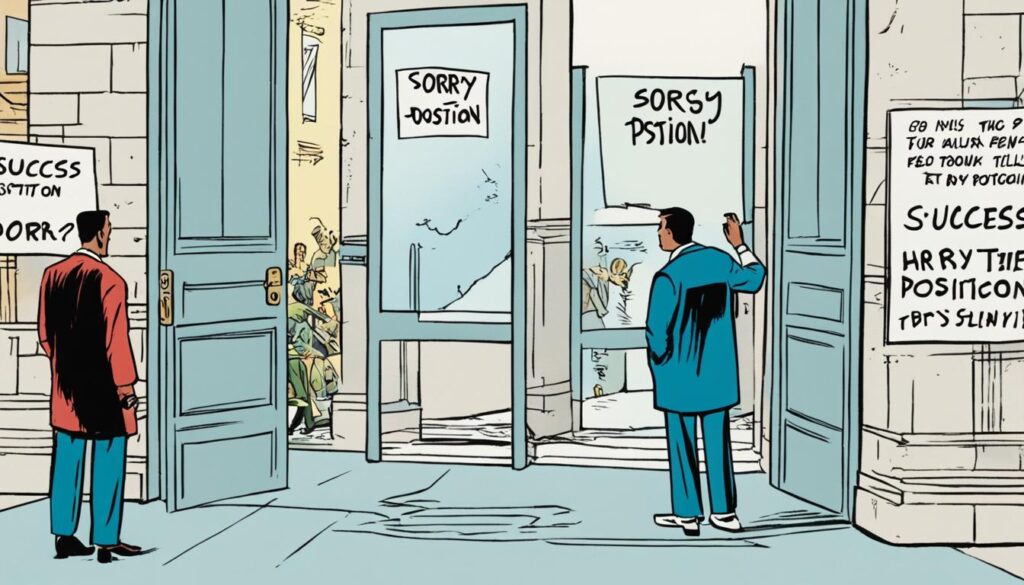Denial of career opportunities is a pressing issue that many individuals face in the workplace. It hinders professional growth, perpetuates inequality, and creates barriers to success. However, by understanding the complexities of this challenge and implementing effective strategies, we can actively promote workplace equality and overcome these obstacles.
In this article, I will explore various strategies and techniques that individuals can employ to navigate the denial of career opportunities effectively. By recognizing common forms of job discrimination and employment bias, understanding the impact of discriminatory practices, and recognizing subtle signs of job promotion disparity, we can equip ourselves with the knowledge to address these issues head-on.

Key Takeaways:
- Understand the common forms of job discrimination and employment bias
- Recognize the impact of discriminatory practices in the workplace
- Learn strategies for overcoming unequal employment opportunities
- Develop self-advocacy techniques for professional growth
- Build a network and seek mentorship to navigate career growth limitations
Understanding Denial of Career Opportunities
In this section, we will delve deeper into the concept of denial of career opportunities and explore its underlying factors and causes. By understanding the complexities of this issue, we can gain a comprehensive understanding of the challenges faced by individuals in their professional journey.
Denial of career opportunities refers to the barriers and biases that prevent individuals from advancing in their careers and accessing equal employment opportunities. It encompasses various forms of discrimination, such as ageism, sexism, racial bias, and other factors that hinder job promotion and growth.
By examining the dimensions of denial of career opportunities, we can uncover the root causes and shed light on the impact it has on individuals and organizations alike.
Research and expert insights play a crucial role in deepening our understanding of this issue. Through extensive studies and analysis, we can identify patterns and trends that contribute to the denial of career opportunities. This knowledge enables us to develop effective strategies and solutions to promote workplace equality and combat discrimination in all its forms.
Understanding denial of career opportunities is the first step towards dismantling barriers and creating a more inclusive and equitable professional landscape.
Common Forms of Job Discrimination and Employment Bias
In order to effectively address and overcome the denial of career opportunities, it is important to understand the common forms of job discrimination and employment bias that individuals may experience in the workplace. These discriminatory practices contribute to workplace inequality and hinder professional growth for many individuals. By recognizing these forms of discrimination, individuals can gain valuable insights into the impact of discriminatory practices and take proactive steps towards creating a more inclusive and equal work environment.
The Impact of Discriminatory Practices in the Workplace
Discriminatory practices in the workplace have a significant impact on both individuals and organizations. They perpetuate workplace inequality by preventing individuals from accessing the same opportunities for career advancement and personal growth. This impacts employee morale, engagement, and productivity, ultimately affecting the overall success and effectiveness of the organization. It is crucial to address and eliminate discriminatory practices to create a fair and inclusive workplace culture that values diversity and promotes equal opportunities for all employees.
Recognizing Subtle Signs of Job Promotion Disparity
Job promotion disparity is often a result of underlying job discrimination and employment bias. It is important for individuals to be able to recognize the subtle signs of job promotion disparity in order to address the issue effectively. These signs may include disparities in access to training and development opportunities, biased performance evaluations, or unequal distribution of high-profile projects. By being aware of these indicators, individuals can take appropriate action to challenge and rectify unfair practices, ensuring equal opportunities for career advancement within the organization.
Discrimination and bias can have a profound impact on individuals and organizations. By understanding the common forms of job discrimination and employment bias and recognizing the subtle signs of job promotion disparity, individuals can play an active role in promoting workplace equality and addressing the denial of career opportunities.
Challenges in Career Advancement Barriers
In navigating denial of career opportunities, individuals often encounter various challenges that hinder their professional growth. Understanding these challenges is crucial to better comprehend the complexities involved in overcoming career advancement barriers. By exploring the obstacles individuals face, readers can gain valuable insights and prepare themselves to tackle these challenges head-on.
One of the key challenges in career advancement barriers is the lack of equal access to opportunities. Many individuals find themselves overlooked for promotions or significant projects due to bias or discriminatory practices within their organizations. This inequality can hinder their ability to progress in their careers and reach their full potential.
“I have witnessed firsthand the challenges faced by individuals when it comes to career advancement barriers. It’s disheartening to see talented and capable professionals being held back due to factors beyond their control.”
In addition, limited visibility and networking opportunities can impede career progression. Without proper exposure to influential leaders or access to networking events, individuals may struggle to make connections and build relationships that can pave the way for advancement. This lack of visibility can create a significant barrier for professionals looking to climb the corporate ladder.
Moreover, the lack of mentorship and guidance can contribute to career advancement challenges. Without experienced mentors to provide guidance, support, and knowledge-sharing, individuals may face difficulties navigating their career paths and making informed decisions. Mentors play a crucial role in professional development by offering insights, advice, and connections that can accelerate progress.
Lastly, balancing work and personal life can present challenges for individuals striving for career advancement. The demands of a competitive work environment, coupled with personal obligations and responsibilities, can create stress and limit the time and energy individuals can dedicate to their professional growth.
Examples of Challenges in Career Advancement Barriers
| Challenge | Description |
|---|---|
| 1. Lack of Equal Access to Opportunities | Some individuals face bias and discrimination, resulting in limited access to career advancement opportunities. |
| 2. Limited Visibility and Networking Opportunities | A lack of exposure to influential leaders and networking events can hinder individuals’ ability to create valuable connections. |
| 3. Lack of Mentorship and Guidance | The absence of mentors can make it challenging for individuals to navigate their career paths and make informed decisions. |
| 4. Work-Life Balance | Balancing personal and professional responsibilities can be difficult and impact career advancement. |
These are just a few examples of the challenges individuals may face when attempting to overcome career advancement barriers. It is crucial to recognize and address these challenges, as they can significantly impact one’s professional growth and overall job satisfaction. In the next section, we will explore strategies and techniques to overcome these obstacles and unlock career advancement opportunities.
Strategies for Overcoming Unequal Employment Opportunities
In order to overcome unequal employment opportunities, it is crucial to employ effective strategies that promote growth and empower individuals to navigate through denial. By utilizing self-advocacy techniques, networking, and finding mentors despite career growth limitations, individuals can actively challenge and overcome barriers in their professional journeys.
Self-Advocacy Techniques for Professional Growth
A key strategy for overcoming unequal employment opportunities is to embrace self-advocacy techniques. This involves taking ownership of one’s career and actively advocating for oneself in the face of denial. By developing confidence, assertiveness, and effective communication skills, individuals can amplify their voices, assert their worth, and demand equal opportunities for career advancement. It is important to clearly articulate goals, strengths, and accomplishments to demonstrate the value one brings to the workplace and to challenge any discriminatory practices.
Networking and Finding Mentors Amidst Career Growth Limitations
Networking and finding mentors play a pivotal role in overcoming career growth limitations that result from unequal employment opportunities. Building a strong professional network allows individuals to access a diverse range of opportunities and leverage the power of connections. Engaging in industry events, joining professional associations, and actively participating in online communities can open doors to new possibilities and advancement. Additionally, finding mentors who have successfully navigated similar challenges can provide invaluable guidance, support, and insights to overcome barriers and achieve career goals. Mentorship relationships can offer encouragement, advice, and access to networks, helping individuals overcome limitations and navigate their career paths effectively.
| Benefits of Self-Advocacy Techniques and Networking: | Importance of Finding Mentors: |
|---|---|
|
|

Legal Aspects of Discriminatory Denial of Career Opportunities
In this section, I will delve into the legal aspects surrounding discriminatory denial of career opportunities. It is crucial for individuals facing such challenges to understand their rights and the legal protections available to them. By scrutinizing laws and regulations, readers gain insights into the workplace discrimination legal framework, enabling effective justice-seeking.
Discrimination based on factors such as race, gender, age, disability, or religion is not only morally wrong but also illegal in many countries. The Civil Rights Act of 1964 in the United States and the Equal Opportunity Act in Australia prohibit employment discrimination, offering legal recourse
Mitigating Effects of Workplace Inequality
Workplace inequality can have far-reaching effects on individuals and organizations, hindering productivity, stifling innovation, and creating a hostile work environment. It is essential to take steps to mitigate these effects and foster a culture of inclusivity and equal opportunity. In this section, we will explore two key strategies for addressing workplace inequality: initiating dialogue about career growth obstacles and developing skills to breakthrough professional growth barriers.
Initiating Dialogue About Career Growth Obstacles
Initiating an open and honest dialogue about workplace obstacles is a crucial step towards addressing career growth inequality. By fostering a secure environment, organizations gain valuable insights into workforce challenges through open employee sharing. This dialogue can bring attention to discriminatory practices and help identify areas where improvements are needed.
When initiating dialogue, it is essential to foster an environment of respect and active listening, where everyone’s experiences and perspectives are valued. Encourage employees to share their stories and provide an opportunity for them to voice their concerns. By actively engaging, organizations demonstrate commitment to address workplace inequality and take meaningful action to rectify it.
Developing Skills to Breakthrough Professional Growth Barriers
To overcome professional growth barriers caused by workplace inequality, it is crucial for individuals to develop the necessary skills and competencies. Through the development of a robust skill set, individuals can strategically position themselves for success, thereby overcoming potential career obstacles.
Identify the specific skills that are most relevant to your professional goals and invest in developing them. This could involve pursuing additional training, attending workshops or conferences, or seeking mentorship from industry leaders. By continuously expanding your skill set, you can enhance your qualifications and increase your chances of overcoming workplace inequality.

| Benefits of Initiating Dialogue | Benefits of Developing Skills |
|---|---|
| 1. Increases awareness of workplace inequality issues. | 1. Enhances individual qualifications and expertise. |
| 2. Builds a culture of openness and inclusivity | 2. Increases self-confidence and self-efficacy. |
| 3. Identifies areas for improvement and change. | 3. Expands career opportunities and options. |
| 4. Promotes collaboration and teamwork. | 4. Provides a foundation for long-term success. |
By combining the efforts of initiating dialogue about career growth obstacles and developing skills, organizations and individuals can work together to mitigate the effects of workplace inequality. Together, we can create a more inclusive and equitable professional landscape where everyone has equal opportunities to thrive.
Personal Stories of Navigating Through Career Advancement Barriers
Personal stories have the power to inspire and motivate us in ways that statistics and theories cannot. In this section, we will showcase the real-life experiences of individuals who have successfully navigated through career advancement barriers. These stories shed light on the resilience, determination, and strategies employed by these individuals to overcome denial of career opportunities.
“I faced numerous rejections and setbacks throughout my career journey. But instead of giving up, I used each rejection as an opportunity to learn and grow. By focusing on my strengths and continuously developing new skills, I eventually found my path to success.”
– Jane Peterson
“When I encountered a glass ceiling in my organization, I decided to take matters into my own hands. I networked tirelessly, found mentors who believed in me, and sought out opportunities to showcase my abilities. Through persistence and hard work, I shattered that glass ceiling and achieved the career growth I deserved.”
– Michael Johnson
These personal stories highlight the importance of perseverance, self-belief, and strategic thinking when faced with career advancement barriers. They demonstrate that with the right mindset and actions, individuals can overcome obstacles and achieve their professional goals. By sharing these stories, we hope to inspire readers to forge their own paths, even in the face of adversity.
Societal and Organizational Changes Against Employment Bias
This section focuses on the societal and organizational changes necessary to combat employment bias and promote a more inclusive professional environment.
Societal changes:
- Increasing awareness and understanding of employment bias through education and public discourse
- Promoting diversity and inclusion in educational institutions and communities
- Advocating for equal opportunities and access to resources for underrepresented groups
- Encouraging open dialogue about systemic discrimination and the importance of equitable employment practices
Organizational changes:
- Implementing diversity and inclusion policies to ensure fair hiring and promotion practices
- Creating mentorship and sponsorship programs to support the career growth of diverse employees
- Establishing clear guidelines on preventing and addressing workplace discrimination
- Investing in unconscious bias training for employees and management
Advocacy and Legislative Reforms
Advocacy plays a crucial role in driving societal and organizational changes that address employment bias. Efforts to promote equity and fairness in the workplace are supported by legislative reforms aimed at dismantling discriminatory practices and creating equal opportunities for all.
Advocacy initiatives include:
- Lobbying for stronger anti-discrimination laws and regulations
- Mobilizing public support and raising awareness through campaigns and initiatives
- Encouraging businesses to adopt inclusive policies and practices through partnerships and collaborations
- Supporting individuals impacted by employment bias through counseling and legal services
Legislative reforms focus on:
- Enacting and enforcing laws that protect individuals from employment discrimination based on gender, race, age, sexual orientation, disability, and other protected characteristics
- Introducing measures to promote pay equity and transparency
- Strengthening whistleblower protections to encourage reporting of discriminatory practices
- Establishing oversight bodies to monitor and address workplace inequalities
Creating Inclusive Workplace Cultures to Reduce Discriminatory Practices
Creating an inclusive workplace culture is vital to reducing discriminatory practices and promoting a harmonious and equitable professional environment.
Key strategies for fostering inclusive workplace cultures include:
- Providing diversity and inclusion training to all employees
- Encouraging open communication and dialogue about diversity issues
- Establishing employee resource groups to support underrepresented communities
- Ensuring fair and transparent performance evaluation processes
- Offering flexible work arrangements to accommodate diverse needs
- Recognizing and celebrating diverse achievements and contributions
- Implementing grievance mechanisms to address discrimination complaints
By prioritizing inclusivity and actively working to reduce discriminatory practices, organizations can cultivate a positive and supportive workplace where all employees can thrive.

Coping with the Emotional Toll of Unequal Employment Opportunities
Dealing with unequal employment opportunities can take a significant emotional toll on individuals. The denial of career opportunities based on factors such as gender, race, or age can lead to frustration, anger, and feelings of inadequacy. It is essential to acknowledge and address these emotional challenges in order to navigate through them effectively.
Recognizing the psychological and emotional impact of denial of career opportunities is the first step towards developing coping strategies. Understanding that the issue is not personal but systemic can help individuals separate their self-worth from external circumstances. It is crucial to remember that the blame lies with the discriminatory practices and not with their own competence or abilities.
Self-care plays a vital role in coping with the emotional toll of unequal employment opportunities. Taking care of one’s physical and mental well-being is crucial during this challenging time. Engaging in activities that promote relaxation, such as exercise, meditation, or hobbies, can help reduce stress and maintain emotional resilience.
Seeking support from trusted friends, family, or professional networks can also provide a valuable outlet for emotional expression. Discussing challenges openly and sharing experiences with others who’ve faced similar situations can offer validation and vital support. Additionally, counseling or therapy can be beneficial in processing emotions and developing coping strategies.
Below is an image highlighting the emotional toll of unequal employment opportunities:
Remember, coping with the emotional toll of unequal employment opportunities is a journey that takes time and effort. Recognizing and addressing emotions, while practicing self-care, helps individuals navigate challenges and maintain well-being.
Denial of Career Opportunities: My Personal Journey and Solutions
Throughout my career, I have encountered numerous instances of denial of career opportunities, facing job discrimination and the limitations it brings. However, I have also discovered effective strategies and cultivated a proactive mindset to overcome these challenges and transform them into opportunities for development. In this section, I will share my personal journey and the solutions I have found, hoping to inspire and empower others facing similar obstacles.
Adopting a Proactive Mindset for Job Discrimination
When confronted with job discrimination, it is crucial to adopt a proactive mindset. Rather than allowing setbacks to define me, I took control of my career by focusing on personal growth and self-improvement. I sought out additional training and education, expanding my skill set and increasing my value as a professional. By continuously learning and adapting, I was able to position myself as a top candidate and challenge discriminatory practices head-on.
In addition, I recognized the importance of mindset shifts in overcoming denial of career opportunities. Instead of dwelling on the limitations imposed by discrimination, I reframed these challenges as opportunities for growth. I embraced a positive outlook and viewed each setback as a chance to learn, evolve, and prove my capabilities. This proactive mindset not only fueled my determination but also opened doors to new possibilities and career advancements.
Turning Career Growth Limitations into Opportunities for Development
One of the most impactful solutions I discovered was transforming career growth limitations into opportunities for development. Rather than succumbing to the restrictions imposed by discriminatory practices, I sought out alternative paths and avenues for advancement. By exploring different industries, networking with like-minded professionals, and taking on side projects, I enhanced my skill set and expanded my professional network.
I also recognized the value of mentorship in overcoming career growth limitations. Seeking guidance from experienced professionals who believed in my potential allowed me to gain valuable insights, navigate obstacles, and accelerate my development. Mentors provided me with invaluable advice, encouragement, and connections, helping me bypass discriminatory barriers and reach new heights in my career.

| Benefits of a Proactive Mindset | Turning Career Growth Limitations into Opportunities |
|---|---|
| 1. Increased resilience – A proactive mindset enables individuals to bounce back from setbacks and maintain motivation despite challenges. | 1. Skill diversification – Career growth limitations can be an opportunity to expand skills and knowledge outside of one’s core area. |
| 2. Enhanced problem-solving abilities – Taking a proactive approach allows individuals to explore creative solutions to overcome job discrimination. | 2. Networking opportunities – Career growth limitations can prompt individuals to expand their professional network and form connections that can open new doors. |
| 3. Increased self-confidence – Proactively addressing job discrimination builds confidence in one’s abilities and strengthens the resolve to succeed. | 3. Personal development – Focusing on personal growth and development can turn career growth limitations into a chance for self-improvement. |
In conclusion, my personal journey navigating denial of career opportunities has revealed the transformative power of a proactive mindset and the ability to turn limitations into opportunities for development. By adopting a proactive approach to job discrimination and harnessing the potential within career growth limitations, individuals can overcome obstacles, thrive professionally, and achieve their true potential.
Conclusion
After exploring the concept of denial of career opportunities and delving into the various forms of job discrimination and employment bias, it is clear that navigating these challenges requires a proactive approach. The impact of discriminatory practices in the workplace cannot be ignored, and recognizing subtle signs of job promotion disparity is essential for promoting workplace equality.
Throughout this article, we have discussed strategies for overcoming unequal employment opportunities, such as self-advocacy techniques and the value of networking and finding mentors. Additionally, we have explored the legal aspects surrounding discriminatory denial of career opportunities, highlighting the rights and remedies available to individuals facing such challenges. We have also examined the importance of initiating dialogue about career growth obstacles and developing skills to break through professional growth barriers.
Although navigating the denial of career opportunities can be challenging, individuals can create change by recognizing their own power. Proactively turning career limitations into growth opportunities helps individuals overcome job discrimination and thrive professionally.
In conclusion, the key takeaway from this article is that taking action is crucial to navigate denial of career opportunities effectively. Implementing discussed strategies fosters career growth and workplace inclusivity.
FAQ
What is denial of career opportunities?
Denial of career opportunities refers to the unfair and discriminatory practices that limit an individual’s ability to advance in their profession. It can take various forms, such as job discrimination, workplace inequality, and job promotion disparity.
Why is it important to understand denial of career opportunities?
Understanding denial of career opportunities is crucial because it sheds light on the challenges individuals face and the impact of discriminatory practices in the workplace. By gaining insight into these issues, individuals can take proactive steps to overcome obstacles, promote workplace equality, and achieve their career goals.
What are common forms of job discrimination and employment bias?
Job discrimination and employment bias can manifest in various ways, such as gender bias, racial discrimination, ageism, or discrimination based on disabilities, sexual orientation, or social class. These discriminatory practices can result in unequal employment opportunities and limited career growth.
How does discriminatory practices in the workplace impact individuals?
Discriminatory practices in the workplace can have a significant impact on individuals, leading to feelings of frustration, demotivation, and a lack of job satisfaction. Moreover, it hinders professional growth, limits career advancement opportunities, and perpetuates workplace inequality.
How can one recognize subtle signs of job promotion disparity?
Recognizing subtle signs of job promotion disparity involves being aware of unequal treatment in terms of job assignments, project opportunities, salary discrepancies, and the lack of diversity in higher-level positions. It often requires careful observation and self-awareness to identify these subtle signs.
What are the challenges in career advancement barriers?
Career advancement barriers pose several challenges, including bias in recruitment and selection processes, limited access to training and development programs, inadequate mentorship opportunities, and biased performance evaluations. These challenges make it difficult for individuals to progress in their careers.
What strategies can individuals employ to overcome unequal employment opportunities?
Individuals can employ various strategies to overcome unequal employment opportunities. These strategies include self-advocacy techniques such as assertiveness, negotiation skills, and effective communication. Additionally, networking and finding mentors can help individuals navigate career growth limitations and build valuable relationships.
What are the legal aspects related to discriminatory denial of career opportunities?
The legal aspects related to discriminatory denial of career opportunities include laws, regulations, and legal protections that prohibit job discrimination and promote workplace equality. Understanding these legal aspects can empower individuals to seek remedies and enforce their rights against employment bias.
How can workplace inequality be mitigated?
Mitigating workplace inequality involves initiating dialogue about career growth obstacles, promoting diversity and inclusion, addressing biases in hiring and promotion practices, and implementing policies and programs that support equal employment opportunities. Creating an inclusive workplace culture is essential in reducing discriminatory practices and fostering equality.
What are some personal stories of individuals navigating through career advancement barriers?
Personal stories of individuals successfully navigating through career advancement barriers highlight their resilience, determination, and strategies employed. These stories serve as inspiration and motivation for others facing similar challenges and offer insights into practical steps that can lead to overcoming denial of career opportunities.
What societal and organizational changes are necessary to combat employment bias?
To combat employment bias, advocacy and legislative reforms are vital. Efforts at both the societal and organizational levels can help address issues of workplace inequality and promote equal employment opportunities. Creating inclusive workplace cultures and supporting initiatives that aim to reduce discriminatory practices are crucial for effecting change.
How can individuals cope with the emotional toll of unequal employment opportunities?
Coping with the emotional toll of unequal employment opportunities requires self-care, seeking support from friends, family, or professional networks, and employing stress management techniques. It is important to prioritize mental health and engage in activities that promote well-being.
What is the significance of adopting a proactive mindset for job discrimination?
Adopting a proactive mindset for job discrimination enables individuals to take charge of their careers and actively address challenges. By being proactive, individuals can identify and challenge discriminatory practices, seek growth opportunities, and navigate through denial of career opportunities effectively.
How can one turn career growth limitations into opportunities for development?
Turning career growth limitations into opportunities for development involves reframing challenges as learning experiences, seeking out alternative paths for growth, and developing and leveraging transferable skills. By embracing a growth mindset, individuals can transform limitations into avenues for personal and professional development.
What are the key takeaways from navigating denial of career opportunities?
The key takeaways from navigating denial of career opportunities include the importance of understanding the various forms of discrimination, recognizing subtle signs of job promotion disparity, employing strategies such as self-advocacy and networking, and striving for societal and organizational changes to combat employment bias. Taking action, embracing a proactive mindset, and seeking support are crucial for effectively navigating through denial and promoting workplace equality.

